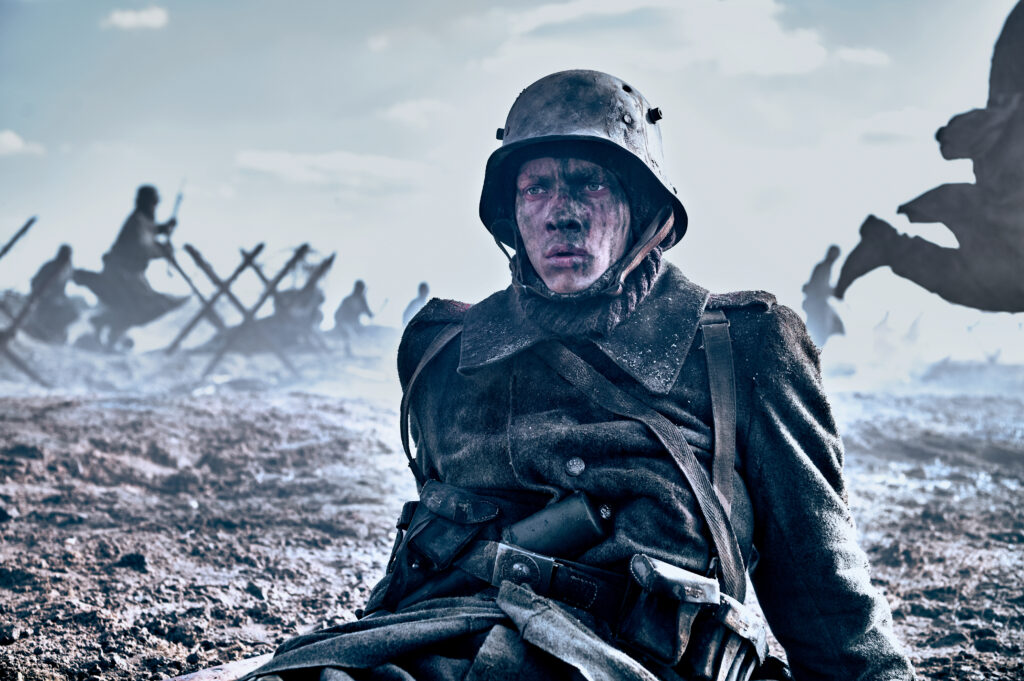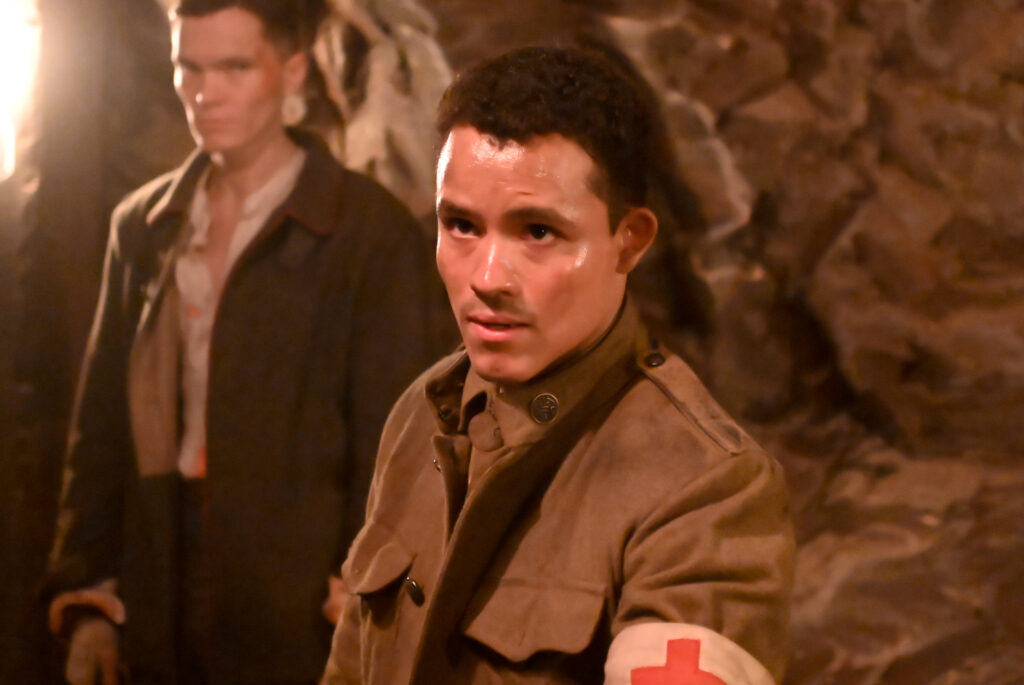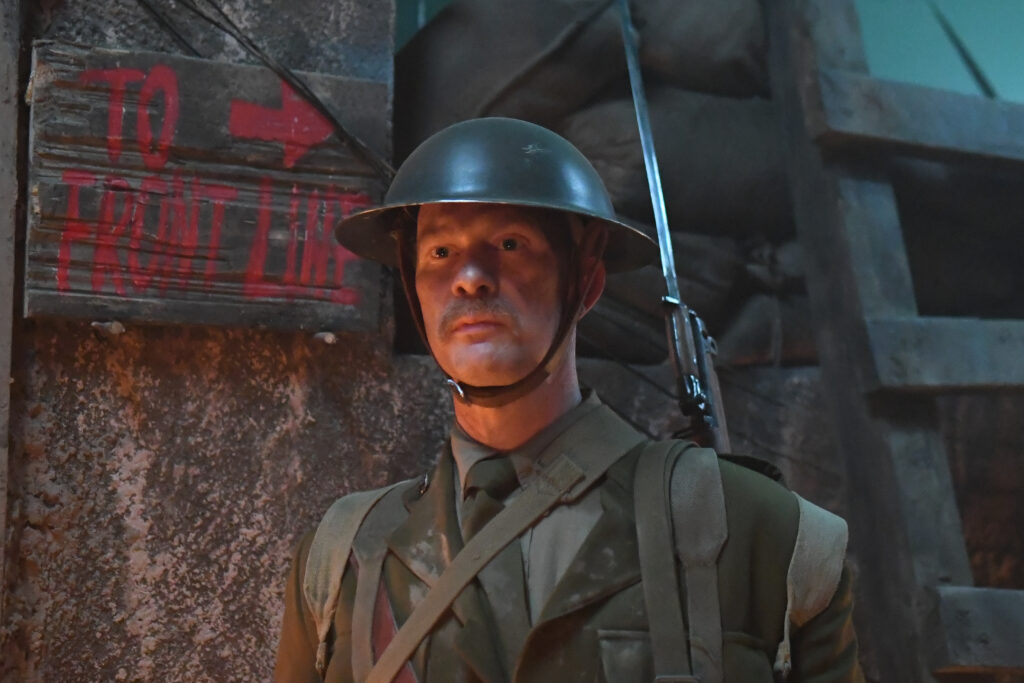March 12, 2023
by Carla Hay

“All Quiet on the Western Front” (2022)
Directed by Edward Berger
German and French with subtitles
Culture Representation: Taking place in Germany and France, from 1917 to 1918, the World War I dramatic film “All Quiet on the Western Front” (based on the novel of the same name) features an all-white cast of characters representing the working-class, middle-class and wealthy.
Culture Clash: A teenager loses his innocence after he becomes a soldier in the German Army during World War I, while a ruthless general and a liberal politician have different ideas about how Germany should handle the war.
Culture Audience: “All Quiet on the Western Front” will appeal primarily to people who are fans of realistic war movies and Erich Maria Remarque’s 1929 novel of the same name.

Told from a German perspective, this version of “All Quiet on the Western Front” is the most brutal and harrowing in showing the horrors of World War I. The movie has well-crafted technical assets, but the personalities of the characters are underdeveloped. The main protagonist is a teenage German soldier. The actor portraying this character has less than 15 minutes of dialogue in this 147-minute movie.
Directed by Edward Berger, the 2022 version of “All Quiet on the Western Front” is based on Erich Maria Remarque’s 1929 novel of the same name. Berger co-wrote the adapted screenplay with Lesley Paterson and Ian Stokell. It’s the third movie version of the novel, following the 1930 version (directed by Lewis Milestone) and the 1979 TV-movie version (directed by by Delbert Mann).
The first two movie adaptations of “All Quiet on the Western Front” were American-made and starred American actors portraying Europeans. The 2022 version of “All Quiet on the Western Front” (which was filmed in the Czech Republic) is a German production and has German actors in the majority of the starring roles. The movie had its world premiere at the 2022 Toronto International Film Festival.
In the 2022 version “All Quiet at the Western Front” (which takes place in Germany and France from 1917 to 1918), viewers see the transformation of teenage German soldier Paul Bäumer (played by Felix Kammerer) from being a naïve recruit who’s eager to participate in the war to an emotionally devastated war veteran who has been worn down by all the death and destruction around him. Meanwhile, the movie shows how two very different government officials have contrasting views on Germany’s actions during this war. One is a liberal politician who wants to negotiate to end the war, while the other is a ruthless general who wants Germany to win the war at any cost.
“All Quiet on the Western Front” begins in early 1917, by showing a young German soldier named Heinrich Gerber (played by Jakob Schmidt) fighting on a battlefield. The movie does a freeze-frame, right when he’s about to attack a French soldier. What happened?
Viewers then see that Heinrich has died, because his body is dumped in a truck that is transporting the corpses of other German military men. The movie then shows that Henrich’s former military uniform has been sent for repairs to a factory in Germany. His name tag is still on the uniform.
In the spring of 1917, quiet and amiable 17-year-old Paul is joyously celebrating his graduation from an all-boys high school at a ceremony attended by by fellow classmates. The school’s headmaster gives the graduates a patriotic pep talk about Germany’s involvement in World War I. Whether or not Paul was thinking about joining the German Army before this pep talk, Paul enlists in the army soon after his graduation.
When he gets his military uniform, Paul notices right away that it has the name tag Heinrich Gerber. He tells the person who gave the uniform to Paul that there must be a mistake, because he was given someone else’s uniform. The uniform is taken away, and Paul is given another uniform. Paul is given an explanation that the uniform that Paul was given by mistake was probably discarded by the previous owner because the uniform was too small.
Of course, viewers (but not Paul) know that the Henrich is dead. And the fact that the German Army is recycling a dead man’s uniform is a symbol of how impersonal and “assembly line” a war can be, in terms of how thousands or millions of soldiers on the front line are treated. Paul is about to find out the hard way that he’s just another number in this vicious war. The movie also shows this “assembly line” symbolism when Paul is assigned the task of collecting military identification tags from dead bodies on battlefields.
Paul and his troop are eventually sent to France, which is occupied by Germany at this time. The expected horrific battle scenes ensue, with graphic depictions of killings and other deaths during combat. But amid the madness and mayhem, Paul bonds with some of his fellow soldiers. The movie’s brightest and most endearing moments come from scenes showing these friendships.
One of Paul’s army buddies is Albert Kropp (played by Aaron Hilmer), who is about the same age as Paul and who becomes Paul’s best friend in this war. Albert, who sees himself as somewhat of a charming ladies’ man, often talks about how he can’t wait for the war to end so he can go back to being around women. As a new recruit, Albert is terrified and very nervous, compared to Paul, who starts off being very enthusiastic and confident about serving his country in this war. But that confidence is then destroyed by several traumatic experiences.
Four other men from Paul’s troop become part of a tight-knit circle of close acquaintances, including Paul. Stanislaus “Kat” Katczinsky (played by Albrecht Schuch), who is in his 30s, likes to portray himself as a cocky “alpha male” type. However, there’s a very poignant scene where Kat (who cannot read) asks Paul to read a letter from Kat’s wife. The letter reveals that Kat’s somewhat arrogant demeanor actually masks a lot of personal pain.
Two of Paul’s classmates from high school are also part of the troop: Franz Müller (played by Moritz Klaus) and Ludwig Behm (played by Adrian Grünewald). Ludwig doesn’t hesitate to show how afraid he is about being in combat. While hiding out with other troop members in a bunker, Ludwig cries out for his mother. He gets some insults from a few of the soldiers, who think Ludwig is being wimpy, but Paul can understand this fear because he feels it too.
Tjaden Stackfleet (played by Edin Hasanovic), who is in his late 20s or early 30s, is a military police officer who dreams of being promoted to the position of corporal. Kat scoffs at Tjaden by saying, “You’ll never be a corporal.” Tjaden (who is deeply insecure) takes this comment as a personal insult but attempts to brush it off, so as not to let it show how much this comment hurt his feelings.
Through it all, Paul tries to hold on to his humanity when the harsh realities of war fighting force Paul and other people in combat to do some very inhumane things. Just like almost every movie that has a lot of war combat scenes, the soldiers face moral dilemmas and have to make split-second decisions that could mean life or death. And for all-male troops, there are machismo issues about who can look the toughest and the bravest.
“All Quiet on the Western Front” is not subtle at all in contrasting the filthy and dangerous living conditions of the soldiers on the front lines of combat and comparing all of it to the pampered and safe living conditions of the leaders who cause these wars. The movie cuts back and forth betwen these contrasts in several scenes. It’s a way to put an emphasis on who really benefits financially from war, which can be a profitable business for some people.
Libeal politician Matthias Erzberger (played by Daniel Brühl) wants to end the war by having Germany peacefully negotiate with France. He meets with France’s Marshal Ferdinand Foch (played by Thibault de Montalembert), who offers a deal that is non-negotiable, with Germany given a deadline of 72 hours to respond to the deal. Erzberger is put in a tough situation: He doesn’t want to give in to these demands too easily, because he knows he might be branded as a traitor to Germany. France’s Generalmajor Maxime Weygand (played by Gabriel Dufay) also plays a role in these tense German-French war discussions.
Being open to negotiating a truce is in direct contrast to what’s desired by General Friedrich (played by Devid Striesow), who is usually shown dining in mansions that are far removed from the war. General Friedrich wants to use the war for his own personal gain, so that he can achieve military glory and all the financial rewards and fame that come with it. Needless to say, General Friedrich is fanatical about Germany winning the war, no matter what the human cost of Germans who die.
“All Quiet on the Western Front” has top-notch production design, cinematography, original score music and sound editing/sound mixing. Where the movie isn’t as stellar is in some of the film editing (which makes the story look a little choppy and abrupt in some scene transitions) and in the screenplay, which has dialogue that tends to be over-simplistic. The screenplay makes many of the movie’s principal characters a little too vague or stereotypical.
Most of the perspective of “All Quiet on the Western Front” comes from Paul, but viewers don’t really get to know a lot of basic things about him during this lengthy film. For example, the movie never shows or tells who Paul’s family is, or what Paul wants to do with his life after the war. And because he doesn’t talk much in this movie, the Paul character could have easily been no more complex than a character in a video game.
However, thanks to the admirable talent of Kammerer in the role of Paul, this character becomes more than just a generic soldier. Kammerer (who has a background in theater/stage acting) makes his feature-film debut in “All Quiet on the Western Front.” He is very effective at showing Paul’s feelings through his eyes, facial expressions and body language.
Paul is the heart and soul of the movie, but it’s a heart and soul that the filmmakers have shrouded in a certain amount of mystery. Even with some things about Paul remaining enigmatic, there’s no mystery over how emotionally shattered Paul becomes during the course of this story. By the end of “All Quiet on the Western Front,” viewers will be emotionally affected too, no matter what people think about war.
Netflix released “All Quiet on the Western Front” in select U.S. cinemas on October 7, 2022. The movie premiered on Netflix on October 28, 2022.


